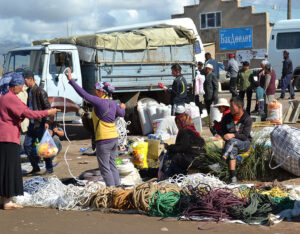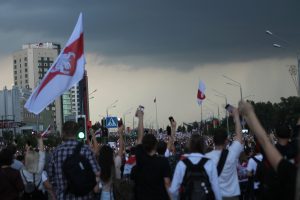European National Policies Series – Spain and Central Asia

Download “European National Policies Series - Spain and Central Asia”
Central Asia holds a complicated place in Spanish foreign policy. Considering Spain’s low profile both in Asia and Eastern Europe, there is a striking fluidity in relations with Kazakhstan and, in previous years, with Uzbekistan. In fact, Central Asia was one of Spain’s priorities during its EU presidency in the first half of 2010. Although it may seem surprising, this interest was actually the result of three years of reinforcement of bilateral relations with Astana and Tashkent, ever since the Spanish presidency of the Organisation for Security and Cooperation in Europe (OSCE) in 2007. In 2010, the year that Spain held the presidency of the EU, Kazakhstan was chair of the OSCE and Uzbekistan was head of the Shanghai Cooperation Organisation (SCO). The Spanish government hoped that the three coinciding presidencies could help it to consolidate the role of Spain in Central Asia. However, high expectations went largely unfulfilled, and two years later, relations have cooled notably, particularly with Uzbekistan.
Spain wants to increase its economic presence in Central Asia. Both the former left-wing government of José Luis Rodriguez Zapatero and the current right- wing administration of Prime Minister Mariano Rajoy regard the promotion of exports as one of the main instruments for overcoming the economic crisis. For this reason, and especially given the presence of some large Spanish multinationals in the region, Kazakhstan is back on Madrid’s foreign policy agenda. Spain’s approach is bilateral rather than regional – Spain- Kazakhstan, not Spain-Central Asia – and it is very much centred on economic exchange. Madrid is also a firm supporter of EU engagement with the region.
Political relations and values
The Spanish chairmanship of the OSCE in 2007 marked a turning point in political relations between Spain and the Central Asian republics. At that time, apart from Kazakhstan, Central Asia represented a void in Spanish diplomacy. The Ministry of Foreign Affairs and Cooperation tried to take advantage of the EU presidency to change the situation in a zone that was perceived by Madrid as being of growing strategic relevance – and one that could offer important economic opportunities.
Kazakhstan was an exception to the general lack of engagement with the region because of the friendship between King Juan Carlos and Kazakhstan’s President Nursultan Nazarbayev. This bond has been a key element in driving forward bilateral relations, including the opening of mutual embassies in 1999. There have been relatively frequent visits between both heads of state (official, private and stopovers), in contrast with the low profile that Spanish diplomacy still maintains in Asia. Nazarbayev has visited Spain on at least seven occasions, and the King has travelled to Kazakhstan five times.(1) Visits of politicians and officials have been less frequent, but some have nevertheless had a significant political impact.(2)
The Spanish OSCE chairmanship actively backed Kazakhstan’s initiative to take the reins of the organisation in 2010. This accelerated and deepened the bilateral link. Soon after his appointment, then Kazakh foreign minister Kanat Saudabayev said that ‘Kazakhstan will never forget that Madrid was the place where the decision about the OSCE presidency took place, in November 2007.’ The rapprochement led to the signing of the Agreement of Strategic Partnership between Spain and Kazakhstan in Astana in July 2009. In its third article it expresses the mutual desire to coordinate their presidencies of the EU and the OSCE in 2010. Several high level meetings were held to facilitate this coordination. Astana was particularly interested in obtaining Spain’s backing for an OSCE Heads of State Summit. The Spanish foreign ministry delegated an ambassador at large for Central Asia to facilitate the coordination among the different schemes and actors involved in Spain’s external action.(3)
In 2010, the urgency of the economic crisis took over the Spanish agenda and it became very centred on domestic affairs. Contrary to the earlier importance given to the event, Spain sent a third vice president of the government – a person with little international profile – to the OSCE Summit in Astana in December 2010. The decline of Spain’s interest was brought about by dissatisfaction with the lack of opportunities for Spanish companies in Kazakhstan, despite the deep support of Spanish diplomacy for the Kazakh OSCE presidency.(4) On the Kazakh side, as in Uzbekistan, the constant postponement of an official royal visit under discussion since 2009 triggered considerable irritation.
The Spanish OSCE chairmanship of 2007 also represented a qualitative jump in relations with Uzbekistan. The OSCE chairman-in-office, Spanish foreign minister Miguel Angel Moratinos, visited the five Central Asian republics and met with the Central Asian presidents in April 2007. Apparently, the approach taken by Minister Moratinos, characterised by a lack of confrontation over democracy and human rights issues, helped create an amicable climate in these meetings. After these meetings, personal links were nurtured. In May 2009, on his way to Brazil, President Islam Karimov made a stopover in Madrid to meet with Moratinos and the king. Some Uzbek sources say that a visit of Juan Carlos to Uzbekistan was agreed on during this meeting. Karimov places great importance on his international recognition, thus close ties with Spain and its royalty is an important asset. On the eve of Spain’s EU presidency, Karimov viewed Madrid also as a good partner that could help improve relations with Brussels.
In late 2009, two big contracts were granted to Spanish companies Initec Energia, an energy company, and Talgo, a train manufacturer. Spanish diplomats interpreted this as an intentional move on the part of Uzbekistan to reinforce bilateral relations. Gulnara Karimova, the president’s daughter, was made ambassador to Spain in January 2010, confirming both parties’ interest in working together. However, expectations were not fulfilled. For various reasons, the king’s trip to Uzbekistan was repeatedly put off. Uzbek irritation peaked with the publication in El País of an article by a well-known journalist, John Carlin. This piece uncovered the murky deals in Uzbekistan of the ex- president of Barcelona Football Club, Joan Laporta, and was very critical of the authoritarian regime.(5) After the publishing of this article, the chances of a royal visit faded, since such a visit could have done serious damage to Spain’s international image. The controversial inauguration in August 2011 of the Spanish train, Talgo, connecting Tashkent with Samarkand, and the departure of Gulnara Karimova as the ambassador to Madrid in September 2011, marked the lowest point in bilateral relations.
Relations with the other three Central Asian republics remain close to insignificant. Kyrgyzstan and Tajikistan are covered by the Spanish embassy in Astana, while Turkmenistan, like Uzbekistan, remains the responsibility of the embassy in Moscow. The opening of a Spanish embassy in Tashkent was approved a few years ago. However, it has been postponed indefinitely due to budget constraints caused by the economic crisis.
Trade and energy
The overall Spanish economic presence in the region remains very limited at present. Spanish foreign direct investment in the region is almost non-existent and bilateral trade figures with the Central Asian republics remain low. The highest turnover is with Kazakhstan. Before the crisis, the volume of annual trade amounted to €800-1,000 million. Since the crisis, this volume has been dramatically reduced to a level of €200-300 million annually. The bulk of this trade is made up of Kazakh exports to Spain of crude oil and iron ore. With a mere €53 million of sales, Spain’s market share in Kazakhstan barely reached 0.25 per cent in 2009. However, some Spanish brands like Zara, Mango, Cortefiel, Springfield, Tous, Pascual and Gallina Blanca are visible. The figures for bilateral trade with the other Central Asian republics are low. They range from €10 to €13 million for Turkmenistan and Uzbekistan to less than €1 million in Tajikistan and around €3 million for Kyrgyzstan.
Spain’s traditionally low profile on the subject of democracy promotion and defence of human rights has facilitated high-level bilateral relations with the authoritarian Central Asian regimes. Although Madrid has tried to take advantage of this fluidity in personal links, the Spanish approach to these sensitive issues is not because of any full-fledged strategy to improve Spanish business penetration in the region. Considering moreover how negotiations have developed and results obtained by Spain, it seems to be more of a handicap than an advantage. Other EU members whose foreign policy is driven, supposedly by the values, have not had objections to bargaining with Central Asian leaders for business deals. Nonetheless, few representatives of major Spanish companies frequently accompanied Prime Minister Zapatero or Minister Moratinos in their visits to Central Asia.
The most visible Spanish presence in Central Asia is the train manufacturer Talgo, which has been operating in Kazakhstan since 2003. Two Talgo trains go between Almaty and Astana daily, and a third train links Almaty to Shymkent. Talgo has reduced by half the time it takes to travel between the old and new capitals of Kazakhstan. These positive results drove the creation of a joint venture with the Kazakh national railway company, Temir Zholy, in June 2010. The joint company, Tulpar Talgo, has established a factory in Astana with the capacity to produce 150 wagons per year, with the aim of replacing Kazakhstan’s outdated stock of passenger trains. In June 2012, Talgo obtained its second biggest international contract ever for the maintenance of 1,044 Kazakh passenger wagons over a period of 15 years for an amount of €1 billion.(6) As mentioned earlier, Talgo also has a presence in Uzbekistan. In December 2009, an agreement was reached for the sale and maintenance of trains for the rail connection between Tashkent and Samarkand. If the signing of this agreement coincided with the strengthening of diplomatic relations, the inauguration of the connection was made at the lowest point. Uzbek authorities denied visas to the Spanish media who claimed to be covering the inauguration, which was held without Spanish representation present.(7)
Crude oil represents the bulk of Spanish imports from Kazakhstan. However, Astana occupies a very modest place among suppliers of oil to Spain. From a general perspective, Spain supports projects that diversify energy supply routes to European markets. But beyond this broad support, Spain has no clearly defined position on the Southern energy corridor. This is influenced by the fact that neither Russia nor the Caspian basin form part of the natural gas supply to Spain. Nevertheless, Madrid pays attention to the Central Asian energy sector. In April 2007, the Spanish company Repsol acquired a 25 per cent stake of an offshore block in the Kazakh oilfield of Zhambay in the northern Caspian Sea. Russian Lukoil has another 25 per cent and the local Kazmunaigaz holds the other half of the rights. Initec Energia won a tender contract in the summer of 2009 also to modernise the combined cycle thermoelectric power plant in Navoi in central Uzbekistan. The development of renewable energies in Central Asia might be of particular interest for Spain. Many Spanish companies are among the most globally competitive in this sector.
Security
In general terms, Spain considers Central Asia to be a relevant area in 21st century world politics and a key arena for configuring a new model of interaction between the great powers (United States, EU, Russia, China and India). It is particularly interested therefore in questions of security and regional geopolitics. For the moment however, potential instability in Central Asia is not perceived by Madrid as a threat to its own security. There is no direct Spanish involvement in security matters, although Spain does support multilateral security initiatives, such as those of the EU, the OSCE and NATO.
Spain has around 1,500 soldiers deployed in Afghanistan, mostly in the west of the country (Herat, Qala-e-Naw and Bagdhis). This contingent is the Spanish contribution to the NATO ISAF Mission. It is the foreign mission that has cost the greatest number of Spanish soldiers’ lives, with 98 casualties to date. The Af-Pak scenario receives considerable attention. Even so, Madrid does not consider its deployment within a wider regional framework, and Central Asia is not really part of Spain’s strategic thinking on Afghanistan. However, from the beginning of 2002 until October 2009, a small Spanish contingent was present at the Manas base in Kyrgyzstan, supporting Spanish troops deployed in Afghanistan. In October 2009, the contingent was forced to abandon this base when the agreement for using the base expired and Madrid and Bishkek were unable to reach an agreement for its renewal. The stalling of negotiations was down to the fact that Madrid refused to pay for its troops’ presence, considering that the matter was covered by a payment from Washington to Bishkek. For a few months, Spanish troops used Dushanbe as a stopover until an over-flight and logistic facilities supply agreement was reached with Kazakhstan.
Spanish-Kazakh defence industry cooperation warrants inclusion. In March 2012, Airbus Military, a division of EADS (European Aeronautic Defence and Space Company) reached an agreement to supply two C295 military transport aircraft to Kazspetsexport, a state company belonging to the Ministry of Defence of Kazakhstan. A memorandum of understanding was signed for a further six C295 aircrafts. The C295 is a medium- sized tactical airlifter for defence and civic missions that is mainly produced by the Spanish division of Airbus in its factory in Seville. The potential sale of two A400M airlifters, also assembled mainly in Seville, has been discussed. In June 2011, coinciding with the meeting in Astana of Prime Minister Zapatero with Kazakh Prime Minister Karim Massimov and President Nazarbayev, the Spanish advanced electronics systems company Indra and the Kazakhstan Engineering National Company agreed to establish a joint venture for assembling radar systems for the Ministry of Defence and security agencies of Kazakhstan. The deal was designated a ‘military secret’ by the Kazakh side.
Development assistance
There is no direct Spanish development aid to Central Asian countries. However, civil society and people-to-people interactions have increased in recent years. Cooperation agreements have been signed by different Spanish universities (Santiago de Compostela, Granada, Madrid, Barcelona) with their Kazakh and Uzbek counterparts to promote academic and student exchanges. There is a growing number of Central Asian students in these universities, as well as in a few masters programmes offered by the Spanish Diplomatic Academy and in renowned business schools like ESADE or IESE. Adoptions of children from Kazakhstan by Spanish families, which have steadily grown in the last decade, is another link.(8) Spanish language, football clubs and culture in general are popular in Kazakhstan and Uzbekistan. However, there is little public knowledge about the region in Spain. The main Spanish think tanks have tried to fill this void in recent times. This includes the initiatives on Central Asia launched by the Alternativas Foundation, CIDOB, Elcano Royal Institute, FRIDE and the IEEE (Spanish Institute of Strategic Studies) of the Ministry of Defence. Energy and security have been the main research interests. Several bilateral friendship associations and cultural initiatives furthermore have been launched. The Spanish-Kyrgyz Association Sumalak has played an outstanding role in the consolidation of a widely connected Central Asian community based in Spain.
Conclusions
The severity of the economic crisis has caused the Spanish government to emphasise economic diplomacy. Kazakhstan seems to occupy a prominent place in the foreign agenda of Madrid. The rhythm of high level visits is set to intensify. The Kazakh minister of industry and new technologies, Aset Isekshev, visited Spain in July. In October, the Kazakh minister of foreign affairs, Yerzhan Kazykhanov, will visit Madrid, and in 2013 Spanish Prime Minister Rajoy is expected to visit Kazakhstan. All of these exchanges are intended to reactivate economic bilateral relations. Opening a Spanish embassy in Tashkent could facilitate the re-launch of relations with Uzbekistan. It remains unlikely however in the current economic climate, unless significant and currently unexpected business opportunities develop.
Central Asia will continue to hold a place on the Spanish foreign agenda, even though a dramatic increase in the economic and political presence of Spain in Kazakhstan and the rest of the region is not foreseeable. Neither is there likely to be a reactivation of the excessive expectations and giddy enthusiasm that marked the period between 2007 and 2010 in Spain’s approach to Central Asia.
- Among these visits, Nazarbayev attended the wedding of Prince Felipe in Madrid in May 2005, and stayed at the summer royal residence in Palma de Mallorca in July 2008. The official visit of the king to Kazakhstan on his way back from China at the end of July 2007 also stands out.
- Such as, for example, the Spanish delegation led by Foreign Minister Miguel Ángel Moratinos was the highest ranking Western representation at the inauguration of President Nazarbayev in January 2006. Other Western countries opted to send delegations of a lower profile as an expression of their dissatisfaction with the conduct of the Kazakh presidential elections in December 2005.
- The late Santiago Chamorro was named the first Ambassador at Large for Central Asia. Santiago Chamorro had been the Spanish ambassador to Kazakhstan from 2005 to 2008. His post at the Spanish embassy in Kazakhstan coincided with the period of the most momentum and deepening of bilateral relations at all levels.
- The efforts of the Kazakh embassy in Madrid to revitalise bilateral relations should be noted. In November 2010, under the auspices of the embassy, the Group of Friends of Kazakhstan was established, with the goal of promoting bilateral relations and improving the image of Kazakhstan in Spain. The Group is composed of well-known personalities of the old guard of the currently-ruling Popular Party (PP), together with representatives of some of the major Spanish companies and other interested individuals and experts (including the author of this brief). However, so far, its real impact has been limited. The Kazakh embassy has had more success in its strategy of reaching out to journalists and media analysts.
- John Carlin, ‘Laporta y la diva uzbeka’ [Laporta and the Uzbek Diva], El País, 9 May 2010, http://elpais.com/diario/2010/05/09/domingo/1273377157_850215.html.
- The biggest contract was signed with Saudi Arabia in October 2012 for a high-speed rail connection between Mecca and Medina. Previous presence in Kazakhstan proved decisive in obtaining this contract, as it permitted the Spanish company to demonstrate its know-how and reliability in extreme climatic conditions.
- See Pilar Bonet, ‘Uzbekistán ningunea a España en la puesta en marcha del AVE’ [Uzbekistan shuns Spain at AVE’s opening ceremony], El País, 30 August 2011, http://internacional.elpais.com/internacional/2011/08/30/actualidad/1314655210_850215.html.
- Spain ranks second after the United States in international adoption. Almost 70 per cent of the minors adopted in Spain come from Russia, China and Ethiopia. From 2003 to 2010, 607 minors from Kazakhstan (of a total number of 31,826) were adopted by Spanish families.
Download “European National Policies Series - Spain and Central Asia”
EUCAM-National-Policies-Brief-8.pdf – Downloaded 475 times – 914.29 KB






